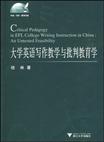大学英语写作教学与批判教育学
2009-4
浙江大学出版社
桂林
133
作者分析在内、外因素影响下的大学英语写作教学的现状,并通过剖析大学英语四级考试样文,揭示在大学英语写作中带有普遍性的问题——“自我缺位”(1ack of self identity)。作者倡导巴西教育哲学家弗莱雷的批判教育学(critical pedagogy),指出目前我国大学英语写作教学的模式是弗莱雷批判的“银行储蓄式教育”(banking model of education)模式,提出:在大学英语写作教学中,应该提倡弗莱雷所倡导的“提问式教育”(problem—posing model of education)。其突出特点是对话式教学和 批判意识,即:通过师生对话,激发学生的“自我”意识,使他们认识到自己是创造知识的主体,从被动地接受教师传授的知识,转变为积极地参与师生对话;通过自己的观察、体验、调研、分析和判断来质疑已有知识,并学会用自己的语言表达自己的想法,从而形成批判的技能,成为具有批判意识的作者(critical writer)。
Chapter 1 Introduction Prelude 1.1 Overview 1.2 Theoretical Framework 1.3 Methodology 1.4 Purpose of the Study 1.5 Overview of ChaptersChapter 2 External English Linguistic Imperialism 2.1 Globalization of English 2.1.1 English linguistic imperialism 2.1.2 The ideological feature of English 2.2 Historical Revelation of Ideology in EFL in China 2.2.1 Phase one: 1862-1918 2.2.2 Phase two: 1919-1949 2.2.3 Phase three: 1950-1976 2.2.4 Phase four: 1977-1990 2.2.5 Phase five: 1991-2007Chapter 3 Internal Institutional Imposition and Teacher Authority 3.1 Institutional Imposition: A National College English Syllabus and a Standardized English Test 3.1.1 A national college English syllabus 3.1.2 A national standardized English test 3.1.3 English for nation building and personal educational, and professional promotion 3.1.4 English for meritocracy 3.2 Teacher Authority: Implementing Institutional Imposition of English-" 3.2.1 Pedagogies in college EFL writing instruction in China 3.2.1.1 Grammar-based approach 3.2.1.2 Functional/Current-traditional approach 3.2.1.3 Genre-based approach 3.2.2 EFL writing instruction: Pragmatic rather than ideologicalChapter 4 Lack of Writer's Self-Identity 4.1 Method 4.2 Findings 4.3 Analyses 4.3.1 The Confucian self 4.3.1.1 A selfless self 4.3.1.2 A relational self 4.3.1.3 A ritual self" 4.3.1.4 Self as a form of the Way (dao) 4.3.2 Mao Zedong's self 4.3.3 Post-Mao Zedong's self 4.4 DiscussionChapter 5 Creating a Critical Writer Identity in EFL College Writing in China 5.1 Critical Pedagogy 5.1.1 Critical consciousness 5.1.2 A dialogical relationship 5.2 From a Banking Paradigm to a Problem-Posing Paradigm: Creating a Critical Writer Identity 5.2.1 Provoking student autonomy through dialogue 5.2.2 Developing critical literacy through empowerment of critical consciousnessChapter 6 Conclusion 6.1 Revisiting the Research Question 6.2 Confronting Barriers to the Implementation of Critical Pedagogy to EFL College Writing in China PostludeReferencesList of Tables
